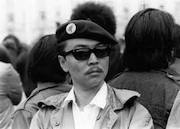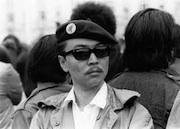Memorial services will be held in early May for Richard Masato Aoki, an Oakland native who was interned as a boy during World War II and later played a key role in the Black Panther Party and the 1969 Third World Liberation Front strike at UC Berkeley.
Mr. Aoki was 70 and died at an Oakland hospital on March 15 after suffering from complications related to diabetes, according to friends.
He became the highest ranking Asian member of the Black Panther Party in the late '60s and worked for 25 years as a teacher, counselor and interim dean at the Peralta Community College District. All along, he urged students to pursue higher education and fight for social justice.
"He played a positive role in terms of reaching out to different races and ethnicities," said Harvey Dong, a friend since 1968.
"His whole life was political because of the circumstances his family went through," Dong added.
Born in 1938, Mr. Aoki was 4 when his family was interned at Topaz, Utah, one of 10 "relocation centers" set up during World War II to isolate West Coast Japanese Americans.
Released in 1945, the family returned to Oakland, said James Aoki, a cousin. Mr. Aoki and his younger brother were raised in a rough West Oakland neighborhood, where he became friends with future Black Panther leader Huey Newton, Mr. Aoki recalled in a 2007 interview.
His mother moved the family to Berkeley and he enrolled at Berkeley High School, where he excelled academically. In a pattern that would define his life, he reached across ethnic lines, joining an interracial boys club that was unusual for the era called the Saints, said high school class mate Earl Napper.
Just three days after graduating in 1957, he went on active duty in the U.S. Army. "He wanted to become the first Asian American four-star general," said his friends Barbara and Oliver Petry.
Mr. Aoki served for eight years and was honorably discharged in 1964.
While attending Merritt College in Oakland, he joined the youth branch of the Socialist Workers Party. Also at Merritt, he was reunited with Newton and met Bobby Seale, fellow students with whom he often discussed radical politics.
When Seale and Newton formed the Black Panther Party in 1966, they took their "10 Point Program" to Mr. Aoki for his comments on it, Seale said.
And when the Panthers began what they called community patrols of Oakland police officers to counter alleged brutality, Mr. Aoki gave Newton and Seale some of their first guns, both Seale and Mr. Aoki later said. It was then legal to carry uncon-cealed weapons, and Dong said Aoki's gesture was symbolic.
Although his role was not then widely known, Mr. Aoki became a Black Panther Party field marshal.
In 1966 he transferred to UC Berkeley, where he earned a master's degree in social work. He helped establish the Asian American Political Alliance on campus, which joined with Chicano, black and Native American student groups in 1969 to form the Third World Liberation Front.
During the nearly-two month campus strike in 1969, Gov. Ronald Reagan declared a state of emergency and sent in the National Guard.
As a result of the strike, UC Berkeley established one of the nation's first ethnic studies programs. Mr. Aoki was an early coordinator of the Asian American Studies program, but left to work at Peralta Community College District in Oakland, where he taught and counseled students, retiring in 1998.
"He really made a difference in a lot of young peoples' lives," said Dr. Naomi P.F. Southard, who was a pastor at Lake Park United Methodist Church.
Mr. Aoki was the last surviving member of his family.
Public memorials are planned for 1 p.m. Saturday at Wheeler Auditorium on the UC Berkeley campus, on May 3 at 11 a.m. at DeFremery Park, and at 2 p.m. at Chapel of the Chimes, both in Oakland.
Memorial services will be held in early May for Richard Masato Aoki, an Oakland native who was interned as a boy during World War II and later played a key role in the Black Panther Party and the 1969 Third World Liberation Front strike at UC Berkeley.
Mr. Aoki was 70 and died at an Oakland hospital on March 15 after suffering from complications related to diabetes, according to friends.
He became the highest ranking Asian member of the Black Panther Party in the late '60s and worked for 25 years as a teacher, counselor and interim dean at the Peralta Community College District. All along, he urged students to pursue higher education and fight for social justice.
"He played a positive role in terms of reaching out to different races and ethnicities," said Harvey Dong, a friend since 1968.
"His whole life was political because of the circumstances his family went through," Dong added.
Born in 1938, Mr. Aoki was 4 when his family was interned at Topaz, Utah, one of 10 "relocation centers" set up during World War II to isolate West Coast Japanese Americans.
Released in 1945, the family returned to Oakland, said James Aoki, a cousin. Mr. Aoki and his younger brother were raised in a rough West Oakland neighborhood, where he became friends with future Black Panther leader Huey Newton, Mr. Aoki recalled in a 2007 interview.
His mother moved the family to Berkeley and he enrolled at Berkeley High School, where he excelled academically. In a pattern that would define his life, he reached across ethnic lines, joining an interracial boys club that was unusual for the era called the Saints, said high school class mate Earl Napper.
Just three days after graduating in 1957, he went on active duty in the U.S. Army. "He wanted to become the first Asian American four-star general," said his friends Barbara and Oliver Petry.
Mr. Aoki served for eight years and was honorably discharged in 1964.
While attending Merritt College in Oakland, he joined the youth branch of the Socialist Workers Party. Also at Merritt, he was reunited with Newton and met Bobby Seale, fellow students with whom he often discussed radical politics.
When Seale and Newton formed the Black Panther Party in 1966, they took their "10 Point Program" to Mr. Aoki for his comments on it, Seale said.
And when the Panthers began what they called community patrols of Oakland police officers to counter alleged brutality, Mr. Aoki gave Newton and Seale some of their first guns, both Seale and Mr. Aoki later said. It was then legal to carry uncon-cealed weapons, and Dong said Aoki's gesture was symbolic.
Although his role was not then widely known, Mr. Aoki became a Black Panther Party field marshal.
In 1966 he transferred to UC Berkeley, where he earned a master's degree in social work. He helped establish the Asian American Political Alliance on campus, which joined with Chicano, black and Native American student groups in 1969 to form the Third World Liberation Front.
During the nearly-two month campus strike in 1969, Gov. Ronald Reagan declared a state of emergency and sent in the National Guard.
As a result of the strike, UC Berkeley established one of the nation's first ethnic studies programs. Mr. Aoki was an early coordinator of the Asian American Studies program, but left to work at Peralta Community College District in Oakland, where he taught and counseled students, retiring in 1998.
"He really made a difference in a lot of young peoples' lives," said Dr. Naomi P.F. Southard, who was a pastor at Lake Park United Methodist Church.
Mr. Aoki was the last surviving member of his family.
Public memorials are planned for 1 p.m. Saturday at Wheeler Auditorium on the UC Berkeley campus, on May 3 at 11 a.m. at DeFremery Park, and at 2 p.m. at Chapel of the Chimes, both in Oakland.
Family Members
Sponsored by Ancestry
Advertisement
Explore more
Sponsored by Ancestry
Advertisement




